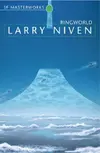
nicanical

Larry Niven's Ringworld is about a massive artificial bracelet encircling a distant sun, and the motley crew sent to explore it. This solid premise is wasted by weak character growth, and the relegation of the titular Ringworld to mere MacGuffin.
The story starts slow, with the first third spent assembling the crew. Niven didn't need to spend a third of the story assembling the crew. Then, when the crew finally reach Ringworld, they just pass the time discussing Puppeteer machinations while jetting around on flycycles. The rest of the plot takes care of itself, as if by providence, but actually by one crew member's good fortunes. ( There's an interesting concept for luck that unfortunately strips the characters of any appearance of agency).
The writing is amateurish in parts: there are clumsy constructions (e.g., strange choices for metaphors); the coined expletive "tanj" is ridiculous and overused; and similar character voices with the omission of too many tags makes the dialogue hard to follow. Ringworld also dates itself through some stereotypes expressed.
I read somewhere that Niven wrote Ringworld to resolve loose ends, and tie his short stories together in anticipation of more novels. If true, it explains why the story feels like such an afterthought. This, fortunately, is somewhat mitigated by Niven's wonderful worldbuilding.
Larry Niven's Ringworld is about a massive artificial bracelet encircling a distant sun, and the motley crew sent to explore it. This solid premise is wasted by weak character growth, and the relegation of the titular Ringworld to mere MacGuffin.
The story starts slow, with the first third spent assembling the crew. Niven didn't need to spend a third of the story assembling the crew. Then, when the crew finally reach Ringworld, they just pass the time discussing Puppeteer machinations while jetting around on flycycles. The rest of the plot takes care of itself, as if by providence, but actually by one crew member's good fortunes. ( There's an interesting concept for luck that unfortunately strips the characters of any appearance of agency).
The writing is amateurish in parts: there are clumsy constructions (e.g., strange choices for metaphors); the coined expletive "tanj" is ridiculous and overused; and similar character voices with the omission of too many tags makes the dialogue hard to follow. Ringworld also dates itself through some stereotypes expressed.
I read somewhere that Niven wrote Ringworld to resolve loose ends, and tie his short stories together in anticipation of more novels. If true, it explains why the story feels like such an afterthought. This, fortunately, is somewhat mitigated by Niven's wonderful worldbuilding.

Larry Niven's Ringworld is about a massive artificial bracelet encircling a distant sun, and the motley crew sent to explore it. It's a good premise wasted by weak character growth, and the relegation of the ring to mere MacGuffin.
The story starts slow, with the first third spent assembling the crew. Niven didn't need to spend a third of the story assembling the crew. Then, when they finally reach Ringworld, the crew just pass the time discussing Puppeteer machinations while jetting around on flycycles; the rest of the plot takes care of itself, as if by providence. This turns out to be close to the truth, which strips the characters of any appearance of agency.
The writing is amateurish in parts: there are clumsy constructions (e.g., strange choices for metaphors); the coined expletive "tanj" is ridiculous and overused; and similar character voices with the omission of too many tags makes the dialogue hard to follow. Ringworld also dates itself through some stereotypes expressed.
I read somewhere that Niven wrote Ringworld to resolve loose ends, and tie his short stories together in anticipation of more novels. If true, it explains why Ringworld's story feels like such an afterthought. This, fortunately mitigated by Niven's wonderful worldbuilding.
Larry Niven's Ringworld is about a massive artificial bracelet encircling a distant sun, and the motley crew sent to explore it. It's a good premise wasted by weak character growth, and the relegation of the ring to mere MacGuffin.
The story starts slow, with the first third spent assembling the crew. Niven didn't need to spend a third of the story assembling the crew. Then, when they finally reach Ringworld, the crew just pass the time discussing Puppeteer machinations while jetting around on flycycles; the rest of the plot takes care of itself, as if by providence. This turns out to be close to the truth, which strips the characters of any appearance of agency.
The writing is amateurish in parts: there are clumsy constructions (e.g., strange choices for metaphors); the coined expletive "tanj" is ridiculous and overused; and similar character voices with the omission of too many tags makes the dialogue hard to follow. Ringworld also dates itself through some stereotypes expressed.
I read somewhere that Niven wrote Ringworld to resolve loose ends, and tie his short stories together in anticipation of more novels. If true, it explains why Ringworld's story feels like such an afterthought. This, fortunately mitigated by Niven's wonderful worldbuilding.

Larry Niven's Ringworld is about a massive artificial bracelet encircling a distant sun, and the motley crew sent to explore it. It's a good premise wasted by thin character growth, and the relegation of the ring to mere MacGuffin.
The story starts slow, with the first third spent assembling the crew. Niven didn't need to spend a third of the story assembling the crew. Then, when they finally reach Ringworld, the crew pass the time discussing Puppeteer machinations while jetting around on flycycles. The rest of the plot takes care of itself, as if by providence. This turns out to be close to the truth which strips the characters of any appearance of agency.
The writing feels amateurish in parts: there are clumsy constructions (e.g., strange choices for metaphors); the coined expletive "tanj" looks ridiculous and is overused; and similar character voices and the omission of too many tags makes the dialogue hard to follow. Ringworld also dates itself through some stereotypes expressed.
I read somewhere that Niven wrote Ringworld to resolve loose ends, and tie his short stories together in anticipation of more novels. If true, it explains why Ringworld's story feels like such an afterthought, only mitigated by Niven's wonderful worldbuilding.
Larry Niven's Ringworld is about a massive artificial bracelet encircling a distant sun, and the motley crew sent to explore it. It's a good premise wasted by thin character growth, and the relegation of the ring to mere MacGuffin.
The story starts slow, with the first third spent assembling the crew. Niven didn't need to spend a third of the story assembling the crew. Then, when they finally reach Ringworld, the crew pass the time discussing Puppeteer machinations while jetting around on flycycles. The rest of the plot takes care of itself, as if by providence. This turns out to be close to the truth which strips the characters of any appearance of agency.
The writing feels amateurish in parts: there are clumsy constructions (e.g., strange choices for metaphors); the coined expletive "tanj" looks ridiculous and is overused; and similar character voices and the omission of too many tags makes the dialogue hard to follow. Ringworld also dates itself through some stereotypes expressed.
I read somewhere that Niven wrote Ringworld to resolve loose ends, and tie his short stories together in anticipation of more novels. If true, it explains why Ringworld's story feels like such an afterthought, only mitigated by Niven's wonderful worldbuilding.

Use of Weapons by Iain M. Banks introduces Cheradenine Zakalwe: an agent with Special Circumstances, the Culture's notorious espionage arm appearing throughout the series.
Weapons presents Zakalwe as a ruthless, morally-flexible martial prodigy, gifted in the field and in command. The story tries to justify this reputation with two alternating narratives—one moving forwards in time, the other backwards with flashbacks.
Zakalwe lives up to his reputation only somewhat. While his actions are far from gifted (his plans are half-cocked, brute force plays lacking tactical insight), the struggle and trauma that would develop into his ruthlessness are vividly and credibly portrayed.
As a composition, Weapons suffers from a few issues.
The first narrative is poorly balanced, spending the same amount of time on setup (with Zakalwe's handler, Diziet Sma) as is spent with Zakalwe himself. This makes Zakalwe's parts feel rushed and abridged.
The second narrative's flashbacks are often disconnected, thematically, from what is happening in the first narrative. Because each chapter alternates between the narratives, the flashbacks have the unfortunate side-effect of disrupting the coherence of the first narrative. I frequently had to review chapter endings to re-situate myself.
Lastly, Banks is fond of his twists. Like other books in the series, Weapons has a twist too. This will be cryptic to avoid spoiling it: while the twist reveal is satisfying, it's also a bit irritating because it raises unanswered questions over the cause and timing.
Use of Weapons by Iain M. Banks introduces Cheradenine Zakalwe: an agent with Special Circumstances, the Culture's notorious espionage arm appearing throughout the series.
Weapons presents Zakalwe as a ruthless, morally-flexible martial prodigy, gifted in the field and in command. The story tries to justify this reputation with two alternating narratives—one moving forwards in time, the other backwards with flashbacks.
Zakalwe lives up to his reputation only somewhat. While his actions are far from gifted (his plans are half-cocked, brute force plays lacking tactical insight), the struggle and trauma that would develop into his ruthlessness are vividly and credibly portrayed.
As a composition, Weapons suffers from a few issues.
The first narrative is poorly balanced, spending the same amount of time on setup (with Zakalwe's handler, Diziet Sma) as is spent with Zakalwe himself. This makes Zakalwe's parts feel rushed and abridged.
The second narrative's flashbacks are often disconnected, thematically, from what is happening in the first narrative. Because each chapter alternates between the narratives, the flashbacks have the unfortunate side-effect of disrupting the coherence of the first narrative. I frequently had to review chapter endings to re-situate myself.
Lastly, Banks is fond of his twists. Like other books in the series, Weapons has a twist too. This will be cryptic to avoid spoiling it: while the twist reveal is satisfying, it's also a bit irritating because it raises unanswered questions over the cause and timing.
Updated a reading goal:
Read 12 books in 2025
Progress so far: 50 / 12 417%
Updated a reading goal:
Read 50 books by December 30, 2025
Progress so far: 50 / 50 100%
Updated a reading goal:
Read 12 books in 2025
Progress so far: 49 / 12 408%
Updated a reading goal:
Read 50 books by December 30, 2025
Progress so far: 49 / 50 98%

Use of Weapons by Iain M. Banks introduces Cheradenine Zakalwe: an agent with Special Circumstances, the Culture's notorious espionage arm appearing throughout the series.
Weapons presents Zakalwe as a ruthless, morally-flexible martial prodigy, gifted in the field and in command, then tries to justify this reputation with two alternating narratives—one moving forwards in time, the other backwards with flashbacks.
Zakalwe lives up to his reputation only somewhat. While his actions are far from gifted (his plans are half-cocked, brute force plays lacking tactical insight), the struggle and trauma that would develop into his ruthlessness are vividly and credibly portrayed.
As a composition, Weapons suffers from a few issues.
The first narrative is poorly balanced, spending the same amount of time on setup (with Zakalwe's handler, Diziet Sma) as is spent with Zakalwe himself. This makes Zakalwe's parts feel rushed and abridged.
The second narrative's flashbacks are often disconnected, thematically, from what is happening in the first narrative. Because each chapter alternates between the narratives, the flashbacks have the unfortunate side-effect of disrupting the coherence of the first narrative. I frequently had to review chapter endings to re-situate myself.
Lastly, Banks is fond of his twists. Like other books in the series, Weapons has a twist too. This will be cryptic to avoid spoiling it: while the reveal is satisfying, it's also a bit irritating because it raises questions over the precise cause and turning point which remain unresolved.
Use of Weapons by Iain M. Banks introduces Cheradenine Zakalwe: an agent with Special Circumstances, the Culture's notorious espionage arm appearing throughout the series.
Weapons presents Zakalwe as a ruthless, morally-flexible martial prodigy, gifted in the field and in command, then tries to justify this reputation with two alternating narratives—one moving forwards in time, the other backwards with flashbacks.
Zakalwe lives up to his reputation only somewhat. While his actions are far from gifted (his plans are half-cocked, brute force plays lacking tactical insight), the struggle and trauma that would develop into his ruthlessness are vividly and credibly portrayed.
As a composition, Weapons suffers from a few issues.
The first narrative is poorly balanced, spending the same amount of time on setup (with Zakalwe's handler, Diziet Sma) as is spent with Zakalwe himself. This makes Zakalwe's parts feel rushed and abridged.
The second narrative's flashbacks are often disconnected, thematically, from what is happening in the first narrative. Because each chapter alternates between the narratives, the flashbacks have the unfortunate side-effect of disrupting the coherence of the first narrative. I frequently had to review chapter endings to re-situate myself.
Lastly, Banks is fond of his twists. Like other books in the series, Weapons has a twist too. This will be cryptic to avoid spoiling it: while the reveal is satisfying, it's also a bit irritating because it raises questions over the precise cause and turning point which remain unresolved.

Added to listOwnedwith 83 books.

















